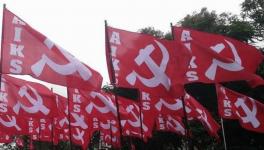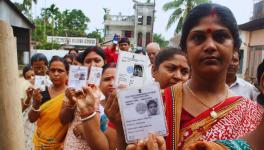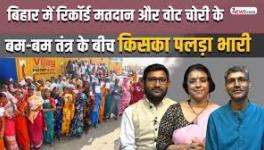Bihar Elections: Ban on Stone Mining Likely to Impact Govt’s Prospects in Rohtas
Sasaram (Rohtas): The blanket ban on stone mining in Kaimur hills in Rohtas district of western Bihar is set to impact the prospects of the National Democratic Alliance (NDA) ahead of the Assembly elections in the state. As the stone quarrying was stopped, lakhs of people were rendered jobless from across the district (from those had secured blocks on lease, crushing machine owners, transporters to daily wage labourers), who were dependent on the stone mining in three blocks of the hills located in Gajwahi and Gayghat villages near district headquarters of Sasaram for their livelihood.
The pollution department of the state government had stopped issuing no objection certificates (NOCs) to crushing machines since 2006. The existing NOCs obtained by all 465 crushers in the region expired and were not renewed over a period of next two years. As a result, the district administration banned the mining in 2008, arguing that no crusher in the region has NOC.
Even those who had got the mines on lease for 22 years, which will expire in 2021, had to stop the excavation because of the ban bearing a huge loss. Notably, the government has already earned revenue from them. As per the procedure, the mining blocks are auctioned and those who place highest bids get the blocks on lease for a certain period. They are supposed to make full payment, as per the tender, in seven years from the date of securing the lease.
“We had already paid the government full revenue, but we could not continue operations for the agreed period. It led to huge losses to us. We were not only cheated but betrayed by the government. As the mining was banned, the government should have returned the money after certain deductions estimated from the quantity of stone mined out. But this did not happen,” Amit Singh Mangal Chandravanshi, president of the Patthar Udyog Sangharsh Morcha, told NewsClick.
Local residents alleged that the mining was banned on the behest of BJP’s Rajya Sabha MP Gopal Narayan Singh, who runs Narayan Medical College and Hospital in the close vicinity, using his political influence.
“Gopal Narayan Singh too had lease of a mining block. After mining money, he set up the medical college and now creates obstacle whenever the auctioning is announced. He does not want mining in the region because it leads to pollution in the region and a hospital should ideally not be in the area,” Mangal alleged.
After a series of protests, fast-unto-death and road blockades over the years, the Mines and Geology Department of the Government of Bihar issued a notification two years back, inviting electronic auction for mining in the three blocks. But the auctioning process was cancelled a day before the tendering process on the order of mining secretary.
Also read: Bihar Elections: JD-U, BJP Leaders Face Protests by Angry Voters during Campaign
“We had applied to take part in the bidding process and had also submitted the fees, etc. But it was cancelled a day before the auction was scheduled to take place,” he said, adding that, “When people protested, the district magistrate (DM) defended the cancellation by arguing that mining cannot take place in the three blocks because of the presence of the medical college.”
The DM, he said, also gave a bizarre logic as to who will ensure that mining is restricted to only six acres area of the hills and the rest 80 acres, which is under the control of the Forest Department, remains untouched.
“It was a laughable argument as preventing illegal mining is the responsibility of the mining department and the police administration, not us. We also ask the government why the medical college was allowed to be constructed in an area where mining has been taking place for generations. Second, why is there a ban in Rohtas only, when it is going on in neighbouring Kaimur and Nalanda districts,” added Chandravanshi.
It’s important to mention here, the Morcha’s chief said, that mining is going on unabated despite the ban, but now it has been taken over by the mafia. “Several hills have been been razed to the ground and the area is plain land, with no trace of a hill there. On top of that, mining is being done much deeper than the permissible limits. It is being done with restricted number of man power and in collusion with the police,” he alleged.
The Morcha had approached the Patna High Court against the Pollution Department not issuing the NOC where the matter is still pending.
He claimed that over 50,000 voters in 12 panchayats of 20 villages, who were dependent on the mining, have decided to teach the NDA a lesson by using their right to vote in favour of the Opposition alliance (the Rashtriya Janata Dal, the Congress and the Left parties).
VISIBLE ANGER AGAINST JD(U), BJP
There is a visible anger against the government among residents who were associated with mining activities in the region.
Sonu Gupta, 35, who runs a roadside eatery at Karwandiya chowk in Sasaram, said he had two tractors that used to ferry stones. In addition, he was also running the roadside eatery. The daily sale, according to him, from his shop was somewhere around Rs 10,000, which has now come down to Rs 1,500-2,000.
“I had a good earning those days. I have two children whom I had planned to impart good education, but all the dreams shattered after mining was banned. The footfall of customers drastically went down because the movement of vehicles ferrying stones, labourers and others stopped,” he said.
Also read: Bihar Elections: It’s Make or Break for BJP
“Lockdown has further turned us upside down economically. We had to starve for several days because of the closure of shop. The government’s help too did not reach us. We somehow survived on the food supplies by civil society,” he continued, adding that the “situation has still not improved because people don’t buy snacks, sweets and tea, fearing corona virus infection”.
“Raising two children and ensuring good education for them and taking care of wife and elderly parents who often need medicines and medical interventions have now become a challenge. The future now looks bleak,” he concluded, with visible anxiety and disappointment over his face.
Raju Singh from Bansa village said a large population of the district was associated with stone quarrying. “In fact, it was the lifeline of the of the region. But the government preferred self-interest of a leader over the source of livelihood of a large population. After the mining was stopped, majority of people either migrated to bigger cities in search of job. Those who stayed back are still searching for employment opportunities,” he added.
A taxi driver, Devendra Kumar from Bansa village, said he, too, was dependent on the mining to make ends meet. “I had three tractors, which were involved in the transportation of stones and machines. My monthly income was above Rs 30,000. Life was too smooth those days. But the decision to ban mining left us shocked. I had to sell the tractors because I was unable to bear the expenses of the vehicles, depending on the only option left, which is agriculture. Now, I own a car, which I drive myself. Since this is the election period, the income is good. Once it will be over, things will go back to normal, with lesser income that will hardly be sufficient to support family expenses only,” he added.
He, too, alleged that it’s a known fact that Gopal Narayan Singh is the main obstacle in auctioning of mining. “He was responsible for the collapse of Dalmiya Group at Dehri-on-Sone. He was president of the union and misguided workers to often go on strike, adversely impacting production and forcing the management to close down the plants,” he alleged.
Also read: Bihar Elections: Once a Crown of Industries in State, Dalmianagar has Become a Ghost Town
He said during lockdown, the DM along with his officers visited their village to suggest that they should stop demanding for re-opening of the mines as it is a closed chapter now. “He said we should now go for fishery, goat keeping and poultry businesses for which the government will give us loan. A large number of people have applied for the same, but the applications have been kept in cold storage,” he claimed
When people went to the DM’s office to know as to what happened to their applications, they were allegedly asked to first identify a piece of land, construct a shed or dig a pond and start rearing goats, chicken and fishes. Then they will get financial assistance by the government.
“We ask the government as to how we will do all this when we don’t have money even for sustenance,” he asked.
Dhirendra Singh from Karwandiya said the MLA (Dr Ashok Kumar of the Janata Dal-United) visits their villages once in five years during elections.
“The chief minister says mountains are our heritage and we need to protect them. First of all, we want to clarify a fact that the hills where mining happens are dead. There is no livestock there and therefore they are leased out for mining. Secondly, if the government is really concerned about its heritage, it should declare them as heritage sites and develop the area for tourism industry to prosper. It will create job opportunities. There are several beautiful hills and waterfalls, but there are not even roads to reach there,” he added.
For Surendra Prasad and Krishna Chowdhary from Bansa, who were daily wage labourers involved in the stone mining, it was the only source of income for them. “We are daily wage labourers today as well but the difference is we had work there for all 30 days but now we struggle to get work everyday,” Prasad added.
When contacted, Rohtas District Magistrate-cum-Collector Pankaj Dixit denied the allegation but refused to make comments in view of the model code on conduct.
The Mining Department’s secretary could not be reached for comments.
Rohtas district is going to polls in the first phase of the three-phase Assembly elections, which will begin from October 28. RJD’s Rajesh Kumar Gupta is taking on Dr Ashok Kumar of the JD(U) from Sasaram Assembly segment. Lok Janshakti Party’s Rameshwar Chaurasia is also in the fray to disturb the political equation of the JD(U) nominee.
Likewise, Satnarayan Yadav of the BJP is faced with Fatehbahadur Singh of the RJD from Dehri Assembly segment.
Get the latest reports & analysis with people's perspective on Protests, movements & deep analytical videos, discussions of the current affairs in your Telegram app. Subscribe to NewsClick's Telegram channel & get Real-Time updates on stories, as they get published on our website.
























